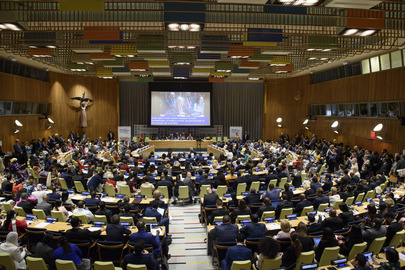The global response to implementing the Sustainable Development Goals (SDGs) has not been ambitious enough, and a renewed commitment and accelerated action is needed to deliver the SDGs in time. This was the key message from the 2019 High-level Political Forum (HLPF), which completed the first four-year cycle of its mandate to review the 17 SDGs and assess progress towards achieving the 2030 Agenda for Sustainable Development (2030 Agenda).“We are not yet on track and must step it up,” said UN Secretary-General António Guterres unequivocally in his opening addresses to the HLPF Ministerial Segment. Four years after the 2030 Agenda was adopted, he said the picture is unsettling, with poverty rates not falling fast enough to meet the 2030 “no poverty” goal, and fair and efficient justice systems are beyond the reach of some 5 billion people. He invited governments to “kickstart a decade of delivery and action.”
The Forum also identified new threats to SDG implementation in line with its mandate to identify emerging issues, such as climate change, a reduced pace of economic growth, the threat of a further decline in the economy, and the “double-edged” sword of new technologies. “Our collective ambition for realizing the 2030 Agenda hinges on how we manage the evolving risks and challenges, and whether we seize the social, economic, and environmental opportunities before us,” said Liu Zhenmin, UN Under-Secretary-General for Economic and Social Affairs, on the first day of the Forum. “Otherwise, we will not be able to fulfill our duty to deliver on the SDGs in time.”
The review of six SDGs during the Forum brought further sobering news: SDG 4 (quality education) is battling a “global learning crisis”; progress on SDG 8 (decent work and economic growth) is “slow and uneven”; income inequality (SDG 10, reduced inequalities) is on the rise; climate change (SDG 13, climate action) is disrupting national economies and affecting lives; and no substantial progress has been made on the SDG 16 (peace, justice, and strong institutions) targets. On SDG 17 (partnerships for the goals), official development assistance (ODA) is down by 2.7% in 2018 compared to 2017, humanitarian aid fell by 8% in the same period, and aid to the least developed countries and African countries, who need it most, is falling.
VNRs were presented by 47 countries during the Ministerial Segment, with seven countries presenting for the second time. This was seen by many as a commitment to both the SDGs and multilateralism, at a time when it is under increasing threat.
In advance of the upcoming review by the UN General Assembly, while many believe the HLPF has fulfilled its functions, there were also many useful suggestions for improvement, including making better use of regional institutions and fora; focusing on interlinkages between goals; and ministerial declarations that capture the discussions of the annual Forum and identify follow-up action.
The HLPF, which took place from 9-18 July at UN Headquarters in New York, was followed by a day of discussion at the High-Level Segment of the Economic and Social Council (ECOSOC) on 19 July, on visions and projections for the future of the SDGs and long-term scenarios.
Over 2000 participants took part in the 2019 HLPF (down from 2458 in 2017, and 2200 in 2018). These included three current or previous Heads of State or Government; seven Deputy or Vice Heads of State or Government; and 90 ministers, 12 vice-ministers, and over 30 other ministerial-level officials. Among these, 27% were from ministries of economy and planning; 22% were from foreign affairs; 13% were from development; 12% from social sectors; 9% from environment; 7% each from finance and education; and 2% from justice. In the general debate during the HLPF Ministerial Segment and the ECOSOC High-level Segment, 241 statements were delivered by the high-level representatives.
(From the Earth Negotiations Bulletin © enb@iisd.org 22 July Monday issue. The Bulletin is published by the International Institute for Sustainable Development.)




